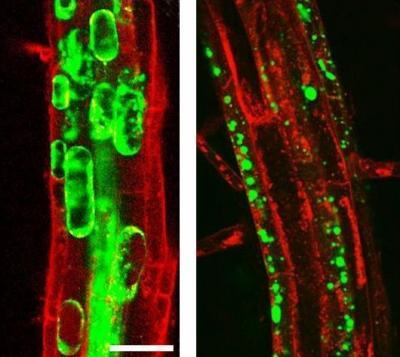What happens if you deprive a group of 7 and 8 year olds of computers, television and games consoles for two weeks?
Psychologist and head of the Department of Media and Communication at the University of Leicester, Professor Barrie Gunter, has been working with the BBC Panorama team to find out.
 Wollemi Pine sample
Wollemi Pine sample Magnified photo at left shows the invasion of heavy oxidation (green bubbles) in the membrane of a wild, stressed, salt-sensitive plant.
Magnified photo at left shows the invasion of heavy oxidation (green bubbles) in the membrane of a wild, stressed, salt-sensitive plant.